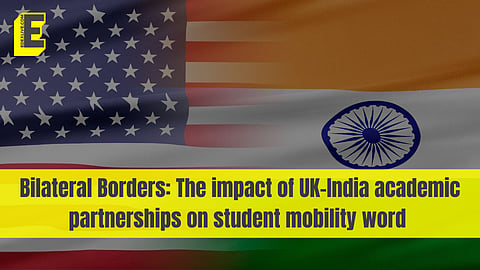

India’s endeavour to achieve a global superpower status will be shaped not merely by its expanding geopolitical influence but also by its pioneering advancements leading to technological self-sufficiency.
As we navigate the Artificial Intelligence (AI) epoch with breakthroughs in quantum computing and other technologies, access to information and mastery of knowledge will serve as a pivotal force determining a nation’s economic growth and political resilience.
To sustain its competitive edge, India must remain at the forefront of global technological progress and intellectual excellence.
The evolving geopolitical landscape has led many nations to adopt a protectionist stance, seeking to safeguard their technological assets and intellectual capital. This is evident through stringent patent protections and impositions on technology transfers, thereby controlling the flow of knowledge.
For instance we've witnessed the United States (US) adopting a more cautious and protectionist stance, with several other nations following suit. In this evolving landscape, India must strategically forge smart global alliances. This, in turn, would safeguard its competitive edge and the nation would have continued access to cutting-edge advancements.
The UK and India have a vast potential for collaboration, starting with English serving as India's lingua franca. Furthermore, the two nations have a longstanding legacy of cultural, educational, and technological cooperation. Add to that, the UK has firmly established itself as a global hub for science and technological innovation.
To illustrate, the UK has an impressive record of Nobel Prizes, with the highest concentration in Physiology and Medicine, thus reflecting its long-standing excellence in scientific innovation.
This was evident during the COVID-19 pandemic, when the UK was among the first to develop vaccines. These achievements present valuable opportunities for educational collaboration between the UK and India, fostering deeper engagement in research and innovation.
Let’s explore the potential forms this collaboration could take by focusing on three key dimensions.
Firstly, strategic partnerships can be fostered between the UK's premier educational institutions and universities in India. These alliances present valuable opportunities for academic exchange, research cooperation, and innovation-driven initiatives.
The second dimension involves government-to-government cooperation, where Memorandums of Understanding (MOUs) and strategic agreements have been formalized to facilitate the seamless transfer of technology, capital, and talent between the two nations.
One notable bilateral collaboration in education and research between the UK and India is UKIERI (UK-India Education and Research Initiative), established in 2006. Spanning four phases, the program aims to address the growing demand for enhanced research and innovation in both nations.
With the exchange of knowledge and ideas across multiple levels, including policymakers, academics, and researchers, it can strengthen the intellectual partnership between the two countries. Such initiatives will further enhance knowledge exchange, promote student mobility, and create greater opportunities for students in both nations.
Since we are discussing student mobility, let’s look at the third dimension. It is crucial that these collaborative efforts are complemented by pragmatic visa and immigration policies.
While government and university partnerships are essential, their efficacy remains constrained unless talent can move seamlessly between the two countries. Mobility frameworks dismantle barriers to knowledge transfer.
This issue should not be viewed solely through the lens of Indian students studying in the UK; rather, it is equally important to create opportunities for UK students, scientists, and researchers to engage with India seamlessly. Processes such as expediting visas and eliminating bureaucratic hurdles like the mandatory foreigner registration (FRO process), would facilitate greater exchange of talent.
With a welcoming environment for UK professionals, India can, in turn, expect reciprocal treatment in the UK as well. This is not only vital for India but also holds significant strategic importance for the UK, particularly as it navigates periods of economic slowdown.
India presents a vast, increasingly liberalised market for pioneering research for both academia and industry. It offers opportunities for postdoctoral researchers, innovators, and entrepreneurs.
Establishing Centers of Excellence and dedicated funding initiatives can position India as a magnet for top global talent, attracting innovators to incubate ideas and drive breakthroughs.
In the long run, nations that successfully draw and retain the brightest minds will dominate in economic growth, technological leadership, and global influence.
For both the UK and India, each represents a crucial market with significant opportunities for mutual engagement and expansion.
(Praneet Mungali is a Trustee of Sanskriti Group of Schools and Educationist. Views expressed are their own.)
